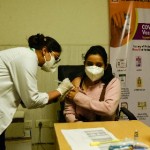In the New Year’s first week, as T.S. Tirumurti, India’s ambassador to the UN, prepared to take his seat in the UN Security Council for a two-year tenure as non-permanent member, another kind of global security was being concurrently consolidated by India. Dr. V.G. Somani, the country’s drugs controller general, announced approval for two vaccines made in India for “restricted use in emergency situation.”
This has triggered “the world’s biggest vaccination programme”, as Prime Minister Narendra Modi put it. On 8 January, the country witnessed a massive dry run for a campaign covering 718 districts, designed to benefit millions of people, and on Jan 12, the first vaccines began their journey to various locations across the country. Simultaneously, India is set to further assist the international community in combatting COVID-19 by providing the vaccine to several countries, both developed and developing.
The nation’s entry into the exclusive club of the V-5 – the five anti-Corona vaccine-producing powers – the U.S., U.K., Russia, China and India – reflects an impressive increase in its soft power and diplomatic influence globally.
The two vaccines approved in India are Covishield, produced by the Serum Institute of India, Pune, in collaboration with Oxford University and AstraZeneca, and Covaxin indigenously developed by Hyderabad-based Bharat Biotech in collaboration with the Indian Council of Medical Research and the National Institute of Virology. Given the heavy toll already exacted by the pandemic, approval for both has been accorded, subject to certain “regulatory conditions.” A few more Indian vaccine candidates in the pipeline have been reporting progress, especially M/s Cadila Healthcare which has been cleared for phase 3 clinical trial.
The goal is to provide vaccinations to about a quarter of the country’s population rating priority, in the coming months. But while engaged in this momentous exercise, the needs of India’s neighbours, partners and friends will not be ignored.
Here, the government plans to astutely balance its internal needs and external requests and expectations.
The first category of countries that are likely to receive vaccine supplies comprises the immediate neighbours in South Asia. Armed with MoUs signed in advance, Bangladesh and Myanmar are top of the queue. External Affairs Minister S. Jaishankar assured his interlocutors in Colombo this week that their request for vaccines would be honoured. Nepal will no doubt press its claim during the visit of Foreign Minister Pradeep Gyawali to New Delhi in mid-January. Bhutan, Maldives and Afghanistan, the friendliest of India’s neighbours, are assured of a positive response. Completing the SAARC circle, sane advice may suggest that Pakistan should not be excluded from the list of beneficiaries, if it were to make a request.
The second category includes friendly countries in the extended neighbourhood: West Asia, Central Asia and the Indian Ocean region states, particularly Mauritius and Seychelles. Official sources indicate that immediate requests from these two categories may be of about 30 million doses. This can be arranged smoothly as the immediate production capacity of Indian companies will touch or exceed 300 million doses in the next six months.
The third category will cover the rest of the world, with the choices to be made carefully in terms of the urgency of need and the nature of relations with India. A sizeable number of countries in Africa and a handful of them in Latin America (such as Brazil) will be provided with India-produced vaccines. In view of the urgency in Brazil and the specific request made by its president, the first supply of vaccines is being arranged immediately.
Several striking features of India’s emergence as a major vaccine or vax power need to be appreciated in the above context.
First, countries that routinely accept Chinese goods, technology and funds have confided to Delhi that their clear preference is for an Indian vaccine over a Chinese one. Why? Because India’s healthcare in general and pharmaceutical knowhow in particular are considered far more reliable.
Second, India’s constructive role at the World Health Organisation (WHO) and endeavours to strengthen and empower the COVAX initiative is significant. This aims to ensure rapid and equitable access to Covid vaccines to all countries. It is the vaccines pillar of the Access to COVID-19 Tools (ACT) Accelerator, which is co-chaired by global vaccine alliance GAVI, the Coalition for Epidemic Preparedness Innovations (CEPI) and WHO. Funds available under the COVAX programme could be deployed for the purchase and export of Indian vaccines to all the needy regions of the world.
Third, vaccine production offers to India a rare opportunity to make inroads into global production and supply chains relating to the pharma sector. This comes at the back of solid achievements of Indian companies in the recent decades to offer life-saving products like the AIDS cocktail, and generic products that are readily accepted in diverse markets ranging from the U.S. and Europe to Mexico, and from South Africa, Kenya to Indonesia. India is the world’s largest exporter of generics, and already has 40% of the U.S. generics market.
With some incremental effort, India can rapidly scale up its capabilities and pharma ecosystem. India’s advantage is innovation, skills, good regulation, compliance, a production chain. It has the world’s largest formulations facilities outside of the U.S., and twice as many U.S. government approved pharma raw materials plants as China. However, it lags China in raw materials and land allocation, and needs to build an R&D base.
As Bill Gates, the Microsoft co-founder and renowned philanthropist, pointed out, more vaccines are made in India than anywhere else in the world.[1] The leap from vaccines to pharma prima of the V-5 group is an achievable goal, making India pharma prima in the V-5 group.
Rajiv Bhatia is Distinguished Fellow, Gateway House and a former ambassador.
This article first appeared in The Times of India.
References
[1] Indian pharma industry capable of producing Covid-19 vaccines for entire world: Bill Gates’, Health World, 16 July 2020. ‘https://health.economictimes.indiatimes.com/news/pharma/indian-pharma-industry-capable-of-producing-covid-19-vaccines-for-entire-world-bill-gates/76999874


